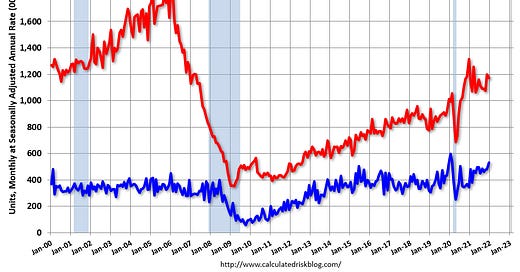December Housing Starts: Most Housing Units Under Construction Since 1973
Housing Starts Increased to 1.702 million Annual Rate in December
From the Census Bureau: Permits, Starts and Completions
Special Note: Permits were distorted in December: “In December, there was a large increase in building permits issued in Philadelphia, PA. Philadelphia enacted several real estate tax changes for residential projects permitted after December 31, 2021.”
Housing Starts:
Privately‐owned housing starts in…
Keep reading with a 7-day free trial
Subscribe to CalculatedRisk Newsletter to keep reading this post and get 7 days of free access to the full post archives.



